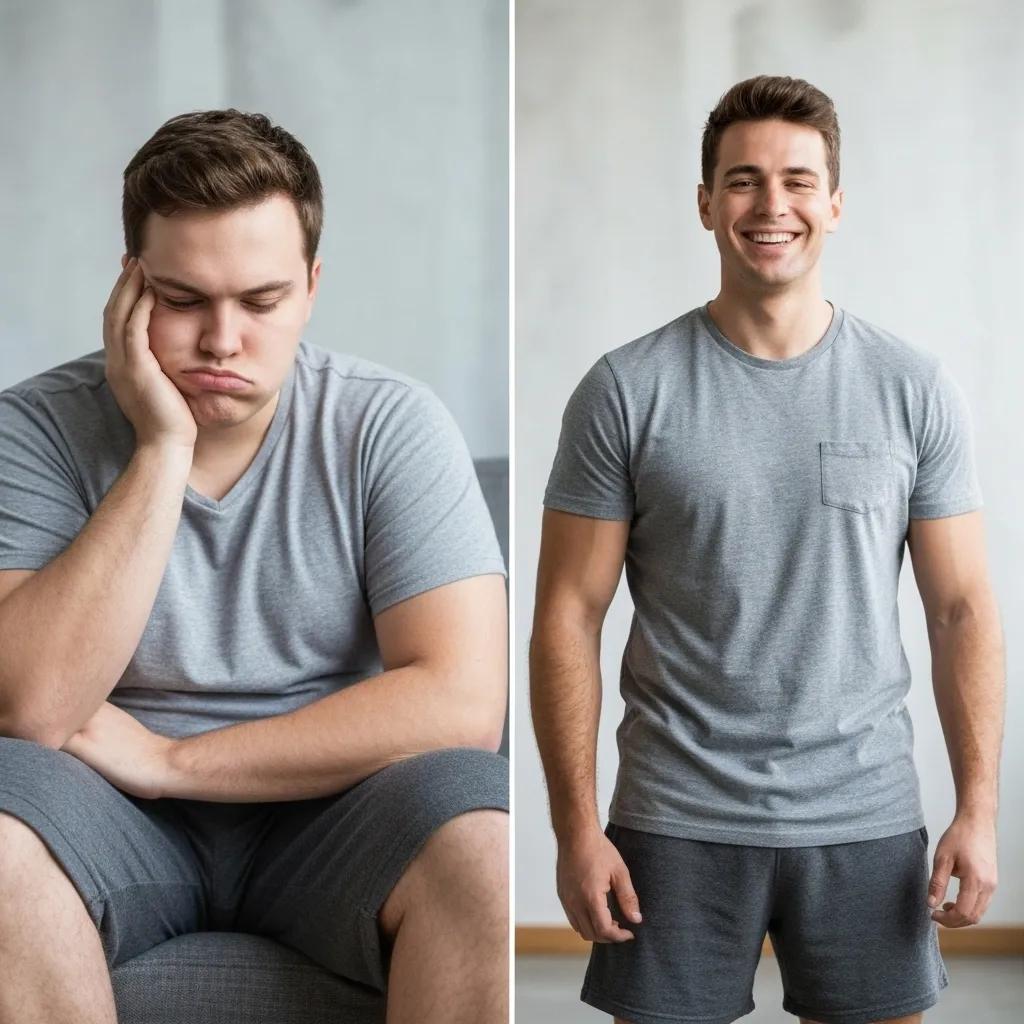
Transform Your Journey: Medical Weight Loss with Ozempic
From Struggle to Success: How Medical Weight Loss with Semaglutide and Doctor-Supervised Programs Helps Patients Keep It Off
Medical weight loss combines targeted medication and physician-guided lifestyle adjustments to achieve lasting fat reduction and better health. In this guide, you’ll learn what medical weight loss involves, how GLP-1 receptor agonists like semaglutide and tirzepatide speed up results, proven methods to maintain your progress, inspiring patient success stories, local program options in Southern California, and the personalized approach Soboba Weight Loss uses to keep you on track. Discover more about our comprehensive approach at Soboba Weight Loss.
What Is Medical Weight Loss and How Does It Support Long-Term Success?
Medical weight loss is a medically supervised plan that integrates prescription medications, tailored nutrition strategies, and continuous physician oversight to promote safe, sustainable fat loss. By addressing hormonal balance, metabolic function, and behavioral patterns, this method helps reduce the likelihood of regaining weight and encourages lasting lifestyle changes. Learn more about effective weight loss diet programs.
How Does Medical Weight Loss Differ from Traditional Diets and Exercise?
Medical weight loss combines evidence-based medications with clinical monitoring, while traditional diets rely solely on calorie restriction and self-directed workouts. Doctors adjust treatments in real-time based on how your body responds, minimizing plateaus and maximizing safety.
Before we compare the approaches, take a look at this table outlining the key differences:
Adjustments made by clinicians in medical programs help reduce weight regain by monitoring your progress and tailoring interventions to your unique physiology.
What Are the Key Components of a Medically Supervised Weight Loss Program?
A successful program incorporates four essential elements for a complete transformation:
- Prescription Medications that help manage appetite and improve insulin sensitivity.
- Nutrition Counseling focusing on balanced macronutrients and appropriate portion sizes.
- Exercise Guidance designed to boost metabolic rate and preserve lean muscle mass.
- Behavioral Support for managing stress, optimizing sleep, and building healthy habits.
Medical Weight Loss Program Components
Effective medical weight loss programs integrate prescription medications, nutrition counseling, exercise guidance, and behavioral support. These components work together to promote safe, sustained fat loss and address hormonal regulation, metabolic adaptation, and behavioral factors, which reduces the risk of weight regain and fosters lasting lifestyle changes.
National Institute of Diabetes and Digestive and Kidney Diseases (NIDDK), National Institutes of Health (2024)
Why Is Physician Supervision Crucial for Safe and Effective Weight Loss?
Physician supervision ensures that you receive the correct dosage, monitors for any side effects, and assesses underlying health conditions like thyroid issues or diabetes. Regular lab tests and clinical check-ups help prevent adverse reactions and optimize treatment effectiveness, giving you confidence in your long-term health improvements.
How Does Soboba Weight Loss Personalize Treatment Plans for Lasting Results?
Soboba Weight Loss tailors each plan by evaluating your medical history, metabolic rate, and lifestyle preferences. Our physicians select the most suitable medication, fine-tune dosage schedules, and adjust nutrition and exercise plans to fit your daily life—maximizing adherence and keeping you motivated toward your goals.
How Do GLP-1 Receptor Agonists Like Semaglutide and Mounjaro Help Patients Lose Weight?

GLP-1 receptor agonists mimic the natural gut hormone GLP-1 to help reduce appetite, slow down digestion, and improve insulin response—leading to significant and sustained weight loss when used with clinical supervision.
GLP-1 Receptor Agonists and Weight Loss
GLP-1 receptor agonists, such as semaglutide and tirzepatide, have proven effective in promoting weight loss by mimicking the effects of the gut hormone GLP-1. These medications work by suppressing appetite, slowing gastric emptying, and improving insulin secretion, leading to significant and sustained weight reduction when combined with clinical supervision.
Garvey, W. T., et al., American Journal of Managed Care (2021)
What Is Semaglutide and How Does It Promote Weight Loss?
Semaglutide (known by brand names like Ozempic and Wegovy) activates GLP-1 receptors in the brain and gut to decrease hunger signals, slow digestion, and increase feelings of fullness. Patients typically experience a 10–15 percent reduction in body weight over 68 weeks under medical supervision.
How Does Tirzepatide (Mounjaro) Compare to Semaglutide for Weight Loss?
Tirzepatide interacts with both GLP-1 and GIP receptors, providing a dual-hormone effect that often results in greater average weight loss. Here’s a direct comparison:
Dual-agonist therapy can accelerate fat loss but may require closer monitoring for gastrointestinal side effects.
What Are the Long-Term Efficacy and Maintenance Strategies for GLP-1 Medications?
Clinical studies show that semaglutide can lead to sustained weight loss for up to 2 years, and tirzepatide for up to 72 weeks. Maintaining these results involves gradually reducing the dosage under physician supervision, along with increasing lifestyle changes to preserve metabolic improvements.
What Are the Common Side Effects and Safety Considerations of GLP-1 Agonists?
The most frequently reported side effects include nausea, diarrhea, and temporary vomiting. Gradually increasing the dosage, using anti-nausea strategies, and making dietary adjustments can help minimize discomfort. Regular monitoring of pancreatic enzymes and thyroid function ensures ongoing safety.
How Can Patients Maintain Weight Loss After Completing Medical Weight Loss Programs?
Sustaining weight loss after stopping medication requires strategic metabolic support, reinforcing healthy habits, and ongoing clinical check-ins.
What Causes Weight Regain After Stopping Medications Like Ozempic or Mounjaro?
When GLP-1 therapy is discontinued, appetite-regulating hormones can return to pre-treatment levels, and gastric emptying may speed up, leading to increased hunger and higher calorie intake. Metabolic adaptation can also lower your resting energy expenditure, making you more prone to regaining weight.
What Lifestyle Changes Are Essential for Sustained Weight Management?
A balanced diet of nutrient-rich whole foods, regular strength training, and mindfulness practices helps stabilize your metabolism and manage emotional eating. Key habits to adopt include:
- Prioritizing protein and fiber in every meal
- Scheduling consistent exercise sessions (both cardio and resistance training)
- Monitoring stress levels and sleep quality through behavioral techniques
Incorporating these routines promotes lasting metabolic resilience.
How Does Gradual Medication Tapering Support Long-Term Success?
Gradual tapering helps maintain some level of receptor stimulation during the transition, preventing sudden increases in hunger. Under clinical guidance, dosage reductions are implemented in stages over weeks or months, while simultaneously reinforcing nutrition and activity improvements.
What Ongoing Support Does Soboba Weight Loss Provide for Maintenance?
Soboba Weight Loss offers monthly follow-up appointments, telehealth coaching, and access to group workshops on nutrition and stress management. Our maintenance portal provides personalized meal plans, exercise trackers, and direct communication with your care team.
What Are Real Patient Success Stories Demonstrating Lasting Weight Loss Results?

Real-life examples highlight the significant impact of medically supervised programs.
How Have Patients Overcome Struggles to Achieve Sustained Weight Loss?
One patient successfully lost 80 pounds over 18 months by combining semaglutide therapy with personalized meal planning and biweekly counseling. Structured accountability and progressive exercise helped restore their confidence and build lasting habits.
What Role Did Medical Supervision and Personalized Plans Play in Their Success?
Consistent physician oversight allowed for timely dosage adjustments, prompt management of plateaus, and tailored interventions based on evolving health markers—providing a crucial safety net that kept patients motivated and on track.
How Do Before-and-After Results Illustrate Long-Term Program Effectiveness?
Visual comparisons, along with body composition data, demonstrate maintained reductions in body fat percentage and improvements in blood pressure, glucose levels, and overall well-being—clear evidence that clinical protocols deliver enduring benefits.
Where Can You Find Trusted Medical Weight Loss Programs Near Me in Southern California?
Residents of Southern California can find local clinics that offer evidence-based medical weight loss programs under the care of qualified physicians.
What Makes Soboba Weight Loss in Laguna Hills and Newport Beach a Leading Clinic?
Soboba Weight Loss stands out with its board-certified specialists, comprehensive GLP-1 protocols, and a concierge-style patient experience. Our state-of-the-art facilities in Laguna Hills and Newport Beach ensure your comfort and convenience throughout your journey.
How Do Local Medical Weight Loss Programs Address California-Specific Needs?
California-licensed providers are familiar with state insurance regulations, offer virtual care options to accommodate busy schedules, and customize plans to suit regional dietary preferences and active lifestyles.
What Are the Costs and Insurance Options for Medical Weight Loss in California?
Program fees typically range from $200–$500 per month, depending on the medication chosen and the support services included. Many private insurance plans cover semaglutide for obesity when specific medical criteria are met; Soboba’s billing specialists assist with verifying benefits and obtaining prior authorization.
What Are the Benefits and Risks of Medical Weight Loss Compared to Bariatric Surgery?
Medical weight loss offers significant results with minimal invasiveness, while bariatric surgery provides more substantial weight loss but comes with surgical risks and a recovery period.
How Effective Is Medical Weight Loss Versus Bariatric Surgery for Obesity?
Medical protocols typically achieve 10–20 percent body weight loss on average, whereas procedures like gastric bypass or sleeve gastrectomy result in 25–35 percent. Both approaches enhance metabolic health but differ in the extent of weight loss and patient suitability.
What Are the Safety Profiles and Recovery Differences?
Medical weight loss carries a low risk of serious complications and does not require hospitalization. Bariatric surgery, however, involves surgical and anesthesia risks, along with a recovery period of several weeks and the need for lifelong nutritional monitoring.
Which Patients Are Best Suited for Medical Weight Loss or Surgery?
Patients with moderate obesity (BMI 30–40) and no severe underlying health issues often benefit most from medical management. Individuals with a BMI of 40 or higher, uncontrolled diabetes, or advanced metabolic conditions may require surgical intervention to achieve optimal outcomes.
How Does Soboba Weight Loss Support Your Journey From Struggle to Success?
Soboba Weight Loss integrates advanced therapies, expert medical care, and supportive resources into every phase of your transformation.
What Is the Soboba Difference in Delivering Lasting Weight Loss?
Our clinic combines personalized GLP-1 treatment plans, in-house dietitians, certified health coaches, and digital health tools to ensure you always have the support you need to progress.
How Can You Start Your Personalized Medical Weight Loss Program Today?
Begin with a thorough consultation—either at our Laguna Hills or Newport Beach location—to discuss your goals, review your medical history, and analyze your lab results. Schedule your initial appointment by calling our office or submitting a request online.
What Resources and Tools Does Soboba Offer for Ongoing Patient Support?
Patients gain access to our online portal, which features meal planners, exercise videos, progress tracking dashboards, and direct messaging with their dedicated care team. Regular webinars and community gatherings provide additional encouragement and celebrate your achievements.
Soboba Weight Loss partners with you every step of the way, from your first consultation to maintaining your success long-term, ensuring your journey transforms from struggle to lasting achievement.
As your physician, I understand how difficult and overwhelming the weight loss journey can feel—but you don’t have to do it alone. At Soboba Weight Loss, my team and I provide safe, medically supervised treatments tailored to your unique needs. Whether you’re exploring options like Ozempic, Mounjaro, or personalized nutrition and lifestyle support, we’re here to help you achieve lasting results. I invite you to schedule a free consultation with us today so we can create a plan that gives you the confidence, energy, and peace of mind you deserve. Visit us at www.sobobaweightloss.com



